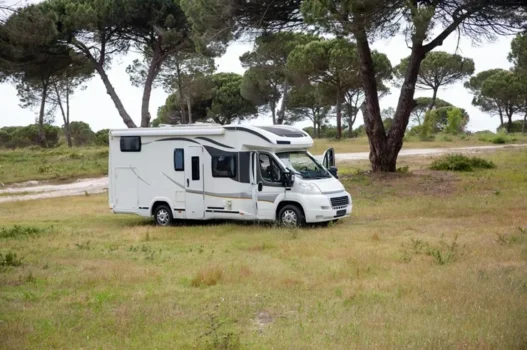The perfect combination of outdoor travel and solar energy: the importance of inverters
In recent years, the combination of outdoor travelling and solar energy has become more and more common as people’s desire for nature and awareness of renewable energy increases. In outdoor adventures, solar energy not only provides us with an environmentally friendly and convenient energy solution, but also enhances our travelling experience in nature. And in this whole solar energy system, the inverter plays a crucial role. In this article, we look at the appeal of outdoor travel, the advantages of solar energy and the key role of inverters.
The appeal of outdoor travel
Outdoor travel allows us to get away from the hustle and bustle of the city and enjoy the magic and serenity of nature. Whether it’s hiking through vast forests, camping by a lake, or scaling lofty mountain peaks, the diversity of outdoor activities can add a unique dimension to our lives. In this context, our energy needs also become particularly special, especially in remote areas where a stable power supply can become a challenge.
Outdoor travel and solar energy
Solar energy, as a renewable energy source, has unrivalled advantages. Firstly, solar energy is inexhaustible and pollution-free, making it an environmentally friendly source of energy; secondly, for outdoor travellers, the accessibility and convenience of solar energy makes it ideal for providing us with power support; and lastly, the use of solar energy effectively reduces dependence on fossil fuels, contributing to sustainable development.
Components of a solar system
A complete solar system usually consists of solar panels, battery storage and an inverter. The solar panels are responsible for converting sunlight into electricity, while the batteries are used to store this electricity so that it can be used when needed. The inverter, on the other hand, being the core component of the entire system, is responsible for converting direct current into alternating current. AC is a form of current that is suitable for use in most household appliances and electronic devices, so the function of the inverter is crucial.
The role of the inverter
The basic principle of an inverter is to receive the DC power generated by the solar panels and then convert it into AC power. This process not only ensures the availability of electricity but also provides a stable voltage and frequency to ensure proper functioning of equipment. Technological advances in inverters have led to significant improvements in their efficiency and performance in converting current, allowing users to enjoy a more stable power supply during outdoor travel.
Selection of Inverter
An inverter is a device that converts direct current (DC) to alternating current (AC), which has a wide range of applications in outdoor travelling, home back-up power, industrial applications and other fields. Choosing the right inverter and using it correctly is essential to ensure the stability and security of your power supply.
Define power requirements:
Power demand is one of the core parameters for selecting an inverter. You need to know the maximum power demand of the equipment to be supplied and select an inverter with a power rating slightly higher than the maximum power demand of the equipment to avoid overloaded operation. For example, if the maximum power requirement of the equipment is 1000W, it is recommended to select an inverter with a power rating of 1200W or higher.
Consider efficiency:
The efficiency of an inverter refers to its energy conversion efficiency in converting DC power to AC power. An inverter with high efficiency reduces energy loss and lowers operating costs. Typically, inverters have efficiencies between 80 and 95 percent. Choosing a high-efficiency inverter will save energy and extend the life of your equipment.
Match the input voltage:
The input voltage range of the inverter should match the DC supply voltage of the equipment. For example, if a 12V DC power supply is used, an inverter with an input voltage range of 10V to 15V should be selected.
Output voltage and frequency:
Most devices require 220V/50Hz AC, but some require 110V/60Hz AC. Therefore, when choosing an inverter, you should make sure that its output voltage and frequency are in line with the equipment’s needs.
Focus on protection features:
Overload protection, short-circuit protection, over-temperature protection and low-voltage protection are important protection functions of inverters. Choosing an inverter with perfect protection functions can effectively extend the service life of the equipment and improve the safety of the system.
Consider the installation environment:
The inverter usually needs to be installed in a well-ventilated, dry and dust-free environment. If the inverter is installed in a hot, humid or dusty environment, it may cause its performance to deteriorate or be damaged. Consideration should also be given to whether the size and weight of the inverter is suitable for the installation space.
Application scenarios of inverters in outdoor travelling
In practical use, an inverter can help travellers with a wide range of power needs. It can charge mobile devices (e.g. mobile phones, cameras, etc.), ensuring that travellers stay connected at all times and record their travels. In addition, the inverter can also provide power for camping lamps, portable coolers and other small electrical appliances to enhance the comfort and convenience of travelling, so that we can enjoy the benefits of modern technology every moment we are outdoors.
Conclusion
To sum up, the combination of solar energy and inverter in outdoor travelling demonstrates the harmonious coexistence of modern technology and natural environment. Inverters are not only an essential and important part of the solar system, but also the key to enhancing the comfort and convenience of outdoor travelling. We encourage everyone to consider using solar energy systems in their future travels to make nature’s journey more exciting and full of possibilities!








